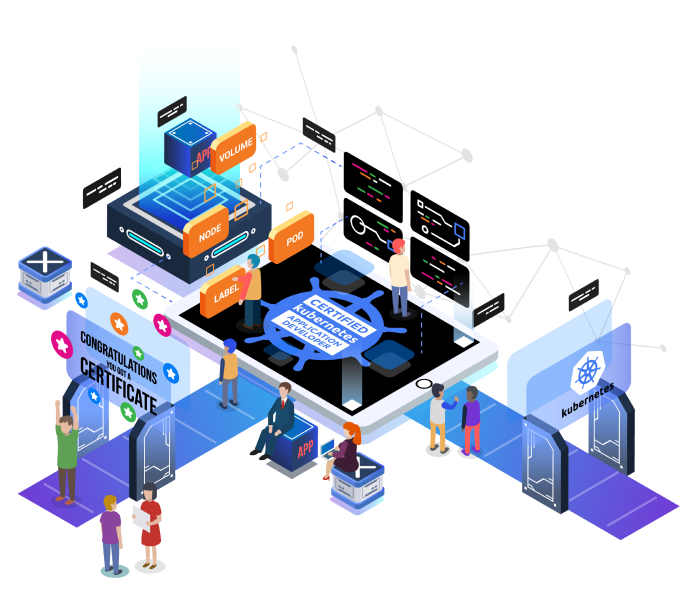Kubernetes Scheduler
Il corso affronterà i concetti di assegnazione workload Kubernetes, proseguirà poi con spiegazioni teoriche e dimostrazioni pratiche che aiuteranno lo studente a controllare l’assegnazione delle risorse e la destinazione dei Pod. il corso prevede esercitazioni in ambiente di laboratorio dove lo studente potrà applicare ciò che viene affrontato consolidando i concetti. Il corso porterà lo sviluppatore o il sistemista ad avere più potere decisionale nell’assegnare determinate risorse in determinati nodi.
Richiede, come prerequisiti, aver completato i corsi DSK201 o DSK202.
COD: DSK305
Categorie: Kubernetes

Metodologia didattica
Il corso prevede laboratori didattici in cui ciascuno studente potrà lavorare ai fini di portare a termine esercizi formativi che forniranno esperienza pratica nell’utilizzo dello strumento, per ciascuno degli argomenti affrontati durante il corso.
Prerequisiti
Al termine del corso i partecipanti saranno in grado di:
Teoria
- Comprendere il funzionamento principale dello scheduler
- Comprendere l’utilizzo dei taints e delle tolerations
- Comprendere il processo di performance tuning dello scheduler
- Comprendere i vari casi di eviction dei pod
Pratica
- Configurare i pod con le varie opzioni di scheduling
- Configurare taints e tolerations
- Configurare pod affinity/anti-affinity
- Configurare node affinity/anti-affinity
- Configurare Priority class
- Gestire i casi di eviction dei pod
Programma didattico
- Kubernetes Scheduler
- Taints and Tolerations
- Assigning Pods to Nodes
- Pod Affinity, Node Affinity and anti-affinity
- Pod Spread Topology
- Pod Overhead
- PriorityClassName
- QoS-classes
- Resource Bin Packing for Extended Resources
- Eviction Policy
- Scheduling Framework
- Scheduler Performance Tuning
Durata – 1 giorno
Erogazione – in Aula, On Site, Remoto
Requisiti PC e SW:
- Connessione Internet
- Web browser, Google Chrome
- Zoom
Lingua
- Formatore: Italiano
- Laboratori: Inglese
- Slide: Inglese
Il prezzo di questo corso della durata di un giorno è di € 1000 + IVA.
Containerd Introduction
-Familiarity with the Linux operating system
-Proficiency in the operating system command line
Kubernetes Introduction
-Basic knowledge of Linux CLI
-Knowledge of basic concepts of containerization and how containers work.
Kubernetes Core Architecture
-Basic knowledge of Linux operating system and command line concepts
-Understanding of the basics of virtualization and containerization
Kubernetes Resource Management
-Completion of DSK101 and DSK102 courses or equivalent knowledge
-Basic knowledge of Kubernetes and container orchestration.
Kubernetes Install, Configure and Manage
-Completion of DSK101 and DSK102 courses or equivalent knowledge
-Basic knowledge of Linux
Kubernetes Application Management
-Familiarity with basic Kubernetes concepts
-Experience with the command line
Helm
-Good knowledge of Kubernetes
-Good knowledge of YAML/JSON
Kubernetes Storage
-Good knowledge of Kubernetes
-Good knowledge of YAML/JSON
Prometheus and Grafana
-Good knowledge of YAML/JSON
-Knowledge of monitoring systems
ELK
-Good knowledge of YAML/JSON
-Knowledge of at least 1 programming language
Jenkins
-Fair knowledge of software development
-Basic knowledge of docker and kubernetes
Elastic Kubernetes Service
-Basic knowledge of AWS public cloud
-Basic knowledge of text editor on terminal
Kubernetes for vSphere
-Basic knowledge of Kubernetes
-Basic knowledge of vSphere
FluxCD
-Basic knowledge of Kubernetes
-Basic knowledge of Git
Kubernetes Install and Configuration
-Concepts of containerization and container orchestration
-Principles of TCP/IP networking and the HTTP protocol.
Kubernetes Advanced Networking
-Experience configuring Kubernetes
-Networking knowledge
Kubernetes Security
-Familiarity with cybersecurity
-Experience with systems and network administration
Kubernetes Scheduler
-Basic knowledge of TCP/IP stack
-Basic knowledge of text editor on terminal
Istio
-Basic knowledge of the YAML language
-Familiarity with microservices architectures
Kubernetes Troubleshooting
-Basic knowledge of linux operating system
-Basic knowledge of TCP/IP stack
CKA Exam Prep
-Completion of CKA learning path
CKAD Exam Prep
-Completion of CKAD learning path
CKS Exam Prep
-Completion of CKS learning path












